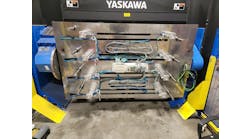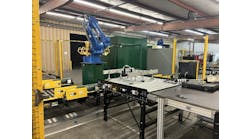Jeremy Pollard, CET, has been writing about technology and software issues for many years. Pollard has been involved in control system programming and training for more than 25 years.
Confounding and confusing is the platform of the day when dealing with and talking about the Internet of Things (IoT).
There are many definitions and opinions about what it is, how it works and why it is important. I have already written about the lack of security in these “things” and the lack of attention to security in those things; one wonders how these things are really going to affect us.
So I wondered about the smart house as the IoT matures. You can have access to all types of household devices, such as door locks, garage door openers, refrigerators and thermostats, using your smartphone.
I also thought about the Coke can that is Internet-enabled and how milk cartons and ketchup bottles will come alive and tell us when it is outdated or getting low and automatically create a shopping list for you or, better yet, send the list to a provider and have it automatically delivered to your door. Maybe it was delivered with an autonomous car that then drops the carton off at your door using an Amazon drone.
Also read: NIWeek speakers take on big analog data and the Industrial Internet of Things
And it really made me wonder who will actually be left in this world that will actually be able to do anything besides sit on the couch, eat chips, drink beer and order stuff online. This was prompted by an article I read about Microsoft and how it is talking up the IoT. Microsoft talks about the data that these connected devices will be able to provide to their owners, regardless of whether it is a bag of milk or a flow valve. And Microsoft is supporting the move to the future by touting its cloud platform, Azure.
Microsoft calls it a revolution. Really? Data from devices has been available for a while, albeit requiring an intermediary device such a computer or a PLC/PAC. And Microsoft is trying to give the impression that Industry 4.0 will be industry 10.0 very soon.
Wow, I thought, what a pump job. The article also suggests that others will have to follow because they will feel like they are being left behind. Marketing at its best. One example used the relationship between robots and humans and the interaction of Azure with Kuka Robotics. Another one included Fujitsu’s "connected cow."
So, the cow thing goes something like this—monitor how much the cow is walking. Yep, that’s it. They are monitoring to find out the time when the cow can be inseminated for breeding. I wonder how the farmers have ever done this before? My niece actually does this in Montana. Didn’t seem like it was a big deal as the window, as she describes it, is pretty big. It’s all relative, I guess. I wonder when there will be an Internet-enabled sperm capsule that pops at exactly the right time with a signal from the cloud. Have I crossed the line here?
But it seemed as though the article was leaning toward data and more data. And of course that data should be in the cloud on Azure. The most important statement was issued by Susan Hauser from Microsoft when she asked how you extract the value from data back to the business. A very intelligent question. How would you?
IBM has been working with big data forever. Mtell is a company that provides plenty of insight into operations for predictive equipment failures. Freepoint Technologies is another. If each piece of equipment could report on its own, then these businesses, which are being implemented successfully, will become redundant.
So IoT is really about the data and doing something with it. Is IoT about being Internet-enabled? Maybe. But, according to Microsoft, it only means anything if it is in the cloud—read, Azure. And if you aren’t doing that, then you will be left behind. Wow, I thought, what will our future look like?
Then I read an article about this Japanese hotel, named Henn-Na which translates to “weird” or “strange” in English. It is totally manned by robotic peeps. The check-in robot is in fact a velociraptor. Seriously, folks. It uses facial recognition to register you and to allow you into your room. They even have robotic AGVs to transport your luggage to the room, which seemingly doesn't require tipping.
The reason for this hotel is to keep rooms inexpensive, because people cost too much. Imagine what data would be available worldwide if these robots and facial ATMs could talk. I’m sure they already do. I wonder about the effect on the spending consumer when robots and the cloud can do it all.
Relying on technology is good, but I truly think and feel that if left up to the big machines, without any oversight or common sense, we could be in for a heap of hurt and disappointment. Stay in school, kids.






